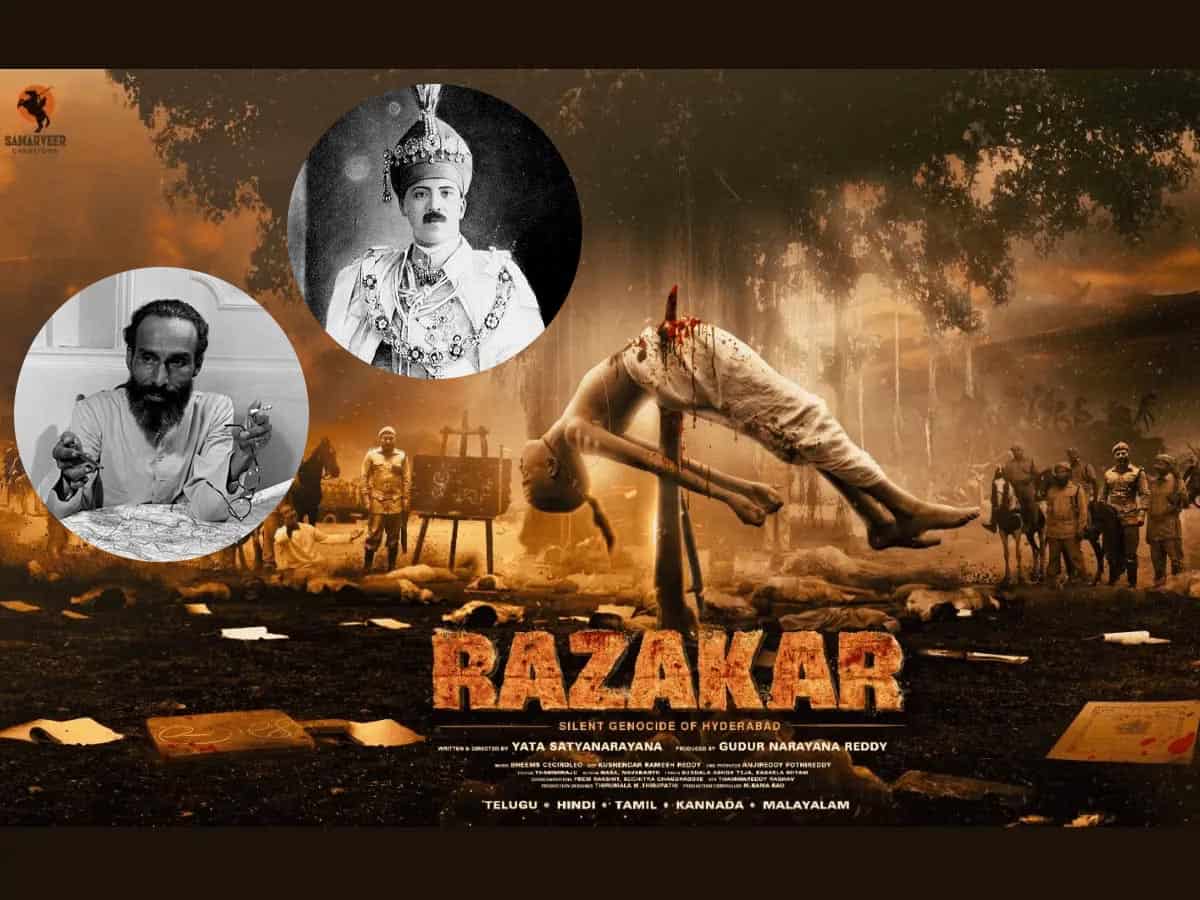
Hyderabad: The Association for Protection of Civil Rights’ (APCR) Telangana chapter has sought the revocation of the awards to the Razakar movie produced by Bharatiya Janata Party (BJP) leader Gudur Narayan Reddy. The movie received those at the state government instituted Telangana Gaddar Awards, where the Hindutva propaganda movie bagged awards under three categories.
In a press conference held on Wednesday, June 19, APCR members including film maker Syed Rafi and journalist N Venu Gopal, urged Telangana chief minister Revanth Reddy to clarify the state government’s position on the issue and to revoke the awards. The movie ‘Razakar: Silent Genocide of Hyderabad’ has been severely criticised by many for being communal and anti-Muslim and also for falsifying historical narratives in Telangana when it was part of the erstwhile Hyderabad state.
It is on the paramilitary organisation Razakar which was formed in the months prior to the annexation of the erstwhile Hyderabad state to India on September, 17, 1948. APCR members asked the state government to reassess the award selection process and to also “ensure alignment with principles of historical accuracy and social unity”. They also have sought a public statement from the chief minister given that the award is named after former naxalite and left figure Balladeer Gaddar, whose ideoligical stance was always opposed to the BJP.
APCR members said that the Razakar movie “distorts history and promotes communal disharmony through a state-backed award named after Gaddar”, who also was part of the Telangana statehood movement (2009 to 2014), until it was achieved.
The Congress government here instituted the Telangana Gaddar Film Awards and gave the Razakar movie an award under three categories – feature film on environment/heritage/ history, best makeup artist, and best music director.
“Rather than addressing the feudal, caste, and social power issues central to the struggle, it falsely depicts Razakars as exclusively Muslim, ignoring their diverse composition and the broader context of the Communist-led peasant rebellion against feudal oppression. The Congress party, which opposed Razakar before its release due to its divisive content, has now endorsed its recognition through the state-backed Gaddar Awards. This contradictory stance has deeply hurt the sentiments of Muslims and secular-minded people across Telangana, who view the awards as an endorsement of communal propaganda,” stated the APCR members.
Razakar movie omits CPI’s role in peasant rebellion
The Razakar movie also majorly ignored the Telangana Armed Struggle (1946-51), a Communist Party of India (CPI)-led peasant rebellion against feudal landlords. It continued all the way till 1951. It was a bigger reason for the Indian army being sent. Many of the CPI’s leaders then were Muslims, and many amongst Muslims in fact also wanted the Nizam to peacefully accede to the Indian government through negotiations.
The rebellion against state-appointed feudal landlords in Telangana was a result of the oppression of peasants and other oppressed caste people who faced continuous harassment and lived in slavery-like situations in Telangana’s districts. The Hyderabad state, run by (initially Mughal-appointed) Nizams from 1724 to 1948, was one of the largest princely states under British India.
All of this, of course either did not make it to the Razakar movie, or was showed in an entirely different way with communal overtones.
More importantly, the larger issue concerning Hyderabad’s annexation or Operation Polo is the killings of thousands of Muslims in the Marathwada and Karnataka parts of the Hyderabad state. While the annexation itself is an issue per se, an estimated 26,000 to 40,000 Muslims lost their lives due to communal violence inflicted on the populace in the aftermath. Given how emotional the entire issue is for people whose families have been affected, both the Razakar violence and the killings of Muslims are equally abhorrent and must be condemned.
What the movie shows
Narayan Reddy, in previous conversations with this journalist, said that he hails from a community of land owners under the Nizam, and that his grandfather had faced Razakars when they were active from 1947-48. The trailer for his movie is clear about what he wants to propagate. The idea that there was a violent streak of anti-Hindu attacks on the majority community in the Hyderabad state.
From scenes of Razakars assaulting and disrespecting Hindus to dialogues like “you should change your religion or leave the state”, the movie is a big attempt to rewrite history by reimagining it from a right-wing Hindutva narrative.
However, this is not the only recent propaganda movie that won an award. The Kashmir Files, another propaganda movie directed by Vivek Agnihotri, also bagged the Best Film at the Dadasaheb Phalke Awards in 2023.
APCR members who addressed the media on the issue were: N. Venu Gopal, Activist & Editor, Veekshanam Anand Singh, Activist, Hyderabad Cinephiles & In Defense of Reason Dr. Pasunoori Ravinder, Poet & Writer, Central Sahitya Akademi Awardee Syed Rafi, Film Director, Producer, Activist, Columnist Sarah Mathews, Activist Prof. Anwar Khan, Social Activist Adv. Afsar Jahan, Telangana High Court Sky Baba, Poet, Journalist, Activist Prem Raj, Film Director, Screenwriter, Storywriter Adv. Mohd Shakeel, President, Indian Union Muslim League (IUML), Telangana Adv. MA Shakeel, Activist Prof. Inam ur Rahman, Historian Oudesh Rani Bawa, Linguist & Historian Sana Ullah Khan, Chairman, SC, ST, VC, Muslim Front Maria Arifuddin, Activist & Educationist


